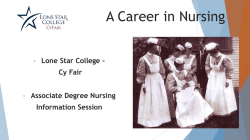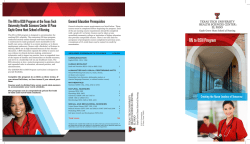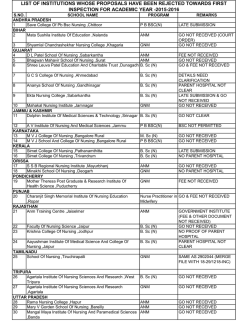
Associate Degree Nursing (ADN) Program Traditional Two-Year
Associate Degree Nursing (ADN) Program Traditional Two-Year Pathway (Day Classes) Fall 2015 Admission Policies and Procedures Deadline Friday, January 30, 2015 Admissions policies and procedures are subject to change as necessary and without prior notice. The items below are required for the ADN selection process by Friday, January 30, 2015: Date Completed KEEP THIS PACKET; THIS IS YOUR CHECK LIST. 1. DCCC Application for Admission for those not currently enrolled at DCCC. 2. Intent Form* for Fall 2015 Associate Degree Nursing submitted for current selection cycle. A.D.N. Intent form is included with this packet; 3. Final high school transcript OR GED Score Report submitted. Current high school seniors must submit a transcript by the January 30 deadline AND follow up with a final transcript by July 1st; 4. Official college transcripts from colleges attended. All transcripts are not required, only those in which you plan to transfer credit must be submitted. College transcripts must arrive in original sealed envelopes. Faxed, copied, and on-line college transcripts are not acceptable; 5. Placement scores meeting ADN placement requirements (or approved equivalent) in the areas of computer skills, reading, writing, math and algebra. 6. Eligibility Review – After completing items 1-5 above, you are responsible for scheduling an Eligibility Review appointment with your Enrollment Counselor between October 1, 2014 – January 30, 2015 by 12:00 p.m. Your Counselor is assigned based upon the first letter of your last name as indicated below: ____________________ Eligibility Review Appt. Date & Time ____ ____ ____ ____ A-G Kathryn Schenk, (336)249-8186, ext. 6419; H-O Jenny Biesecker, (336)249-8186, ext. 6418; P–Z Brian Eshleman, (336) 249-8186, ext. 6277; Davie Campus Sandra Porter, (336)751-2885, ext. 4853 During your review, items1-5 above are reviewed for completion. TEAS –Version V Scores-- The Test of Essential Academic Skills – Version V, a computerized test of reading comprehension, sentence skills, science, and math problem solving will be used in the scoring and ranking process. • Testing will be conducted by appointment beginning December 2014 and should be completed by the January 30, 2015 deadline. • Multiple dates and times will be available for the TEAS Test, however, you may take the test only once per ADN selection cycle. TEAS scores from another college must be approved by your Enrollment Counselor BEFORE the January 30th Deadline. These scores must be less than 6 months old as of January 30. • Eligible applicants should complete their eligibility review for a TEAS testing slip and make TEAS appointments online at www.atitesting.com • Please note the test will be given on the Davidson and Davie campuses but appointments MUST be made online and students are not able to test until they have completed their eligibility review. • The test is $56 and study materials are available for an additional cost through DCCC’s Bookstore and also available on the ATI website at: http://www.atitesting.com/ati_store/TEAS-products.aspx • TEAS workshops will be offered September 2014 – January 2015 in the Learning Commons on the Davidson campus – Additional information is available via the Learning Commons webpage under Workshops: https://davidsonccc.edu/lc • Completion of the TEAS test without also meeting all other eligibility requirements will not allow competition. *NOTE: Completion of all items above does not guarantee acceptance into the program. Nursing Assistant 1(NA 1) Certification - Important Reminder: Nursing applicants are encouraged to complete an *approved NA 1 training program as early as possible due to high demand and limited seats in each course. Proof of NA 1 training and listing on the State NA1 registry is required of nursing students prior to the first day of class. A listing of approved NA1 programs can be found: http://www.ncdhhs.gov/dhsr/hcpr/pdf/trainingprograms.pdf SUMMARY OF IMPORTANT DATES AND DEADLINES: Fall 2015 ADN Packet and Intent Form Available: September 2, 2014 through January 30, 2015 Completion of all preparatory courses Application, transcripts, placement, Eligibility Review and TEAS DEADLINE TEAS Testing appointments (various days and times) Acceptance/Alternate Letters mailed on or by January, 2015 January 30, 2015 December 2014 – January 30, 2015 March 10, 2015 PLACEMENT ASSESSMENT AND EDUCATIONAL BACKGROUND INFORMATION: One criterion for each subject must be met to achieve program eligibility. Other placement tests or high school transcript exemptions are subject to approval by your Enrollment Counselor. COMPUTER SKILLS Computer Skills score of 60 or above within the last 5 years Satisfactory completion of CTS 080 within the last 5 years. Satisfactory completion (grade “C” or above) of an acceptable college-level (associate degree or higher) or high school computer course within the last 5 years. WRITING ACCUPLACER Sentence Skills score of 86 or above or combined score of 166 with reading within the last 5 years Satisfactory completion of ENG 090 or ENG 095 or DRE 098 or DRE099 Satisfactory completion (“C” or above) of an acceptable college-level (associate degree or higher) course in English composition. READING ACCUPLACER Reading Comprehension score of 80 or above or combined score of 166 with sentence skills within the last 5 years Satisfactory completion of RED 090 or ENG 095 or DRE 098 or DRE 099 Satisfactory completion (“C” or above) of an acceptable college-level (associate degree or higher) course in English composition MATH ACCUPLACER DMA 010 – 030 with a score of 7 or Arithmetic Skills score of 55 or above within the last 5 years Satisfactory completion of MAT 060 or DMA 010 – DMA 030 Satisfactory completion (“C” or above) of an acceptable college-level (associate degree or higher) math course ALGEBRA ACCUPLACER DMA 040 with a score of 7 or Algebra skills score of 55 or above within the last 5 years Satisfactory completion of MAT 070 or DMA 040 Satisfactory completion (“C” or above) of an acceptable college-level (associate degree or higher) math course Ranking and Notification of Acceptance/Alternate Status: The maximum number of points possible in the ranking process is 16. • TEAS score earns from 0 to10 ranking points. *Students must score a 62 to be ranked. • BIO 165 or BIO166 completed at DCCC or transferred to DCCC earns 2 to 4 bonus points determined by the final grade (or current high school seniors with a completed HS lab science above general biology with a grade of ‘A’ or ‘B’ may earn 2 bonus points). Points will be given for either BIO165 or BIO 166 with the highest grade if both are completed by deadline. • College Math (Math 115 or higher) earns 1 point • ACA 090 completed at DCCC with a grade of SC or higher earns 1 bonus point. If applicants have identical total admission points, the following component scores will be used to further delineate candidates: 1. 2. 3. 2 TEAS Composite Score TEAS Reading Score TEAS Math Score 4. BIO Points 5. ACA Point Acceptance and alternate letters will be mailed on March 10, 2015. Applicants with the highest overall scores will be offered program acceptance and remaining students will be placed on an alternate list in ranked order. Alternates will be called by that order should space become available (until the first day of class for Fall 2015). Applicants who remain on the alternate list will not be carried over to a waiting list for the following year and must renew the intent process for consideration the following year. **NOTE: DCCC students are permitted to compete for TWO selective programs** Accepted ADN Student Follow-Up: Newly admitted ADN students must return a Confirmation Form to the Admissions Office to accept or decline the program seat by Friday, April 3, 2015. Newly admitted ADN students must attend the student success seminar held the summer prior to the August start date of fall classes. This date is provided in the acceptance packet. The following requirements are verified by the School of Health, Wellness and Public Safety after acceptance: o Satisfactory completion of an approved* Nurse Aide I training program. (See Page 2) o Current CPR certification less than12 months old on the first day of Fall 2015 classes; Must include both one- and two-rescuers and both adult and child techniques. Courses meeting criteria include: American Heart Association CPR for Health Care Providers. o Health & Clinical forms completed, signed and returned by July 15, 2015 to the Nursing Department Staff (Forms will be included in acceptance packets); o Maintain final grade(s) of “C” or higher in any ADN required course after being admitted and beginning the nursing courses in the program. Failure to meet these follow-up requirements will result in ACCEPTANCE BEING REVOKED. *The following information has been provided by the Nursing Department at DCCC.* HEALTH EVALUATION FOR ACCEPTED ADN STUDENTS: Applicants should be aware that admission to the ADN Program is dependent upon physical and emotional health, compatible with the ability to provide safe patient care. To document evidence of satisfactory health, accepted ADN students may access a copy of the Student Health Forms, available on the website A (ht t p: / / dav i ds onc c c . edu/ c ondi t i onal l y - ac c ept ed- nur s i ng- c l i ni c al - t r ai ni ng- r equi r ement s ). physical examination performed no more than one year prior to the prospective date of entry into the program is required. Proof of required immunizations are also required. The cost to obtain the physical examination and required vaccinations is the responsibility of the student and should be completed in a timely manner for program entry. An applicant with problems in physical or emotional health must provide evidence that appropriate treatment and/or counseling has taken place and that the problem has been alleviated. Persons with physical or emotional problems, which have not responded to treatment within a reasonable time, may be denied admission to the program. All health forms must be completed and returned to the Associate Degree Nursing Program (Briggs Technology202A) no later than July 15, 2015. If these forms are not received or are received incomplete by that date, admission into the ADN Program will be revoked and the space will be offered to another applicant. Detailed information about the due dates for health records will be provided to accepted applicants. CRIMINAL BACKGROUND CHECK & DRUG SCREENING FOR ACCEPTED ADN STUDENTS Clinical sites require a criminal background check and drug screening prior to participation in clinical site visits. Background checks are conducted through a contracted agency and include nation-wide criminal record and sexual predator checks. A 12-panel urine drug screen must be obtained from a DCCC-approved lab. Additional details can be obtained on the website: ht t p: / / dav i ds onc c c . edu/ c ondi t i onal l y - ac c ept ed- nur s i ng- c l i ni c al - t r ai ni ng- r equi r ement s If any facility refuses to allow the student to participate in the clinical experience at that agency as a result of those findings, the student will not be able to progress in the program. Inability to progress will result in failure of the course and removal from the program. 3 Applicants for initial nursing licensure in North Carolina must have a criminal background check as well. SCHEDULING OF CLASSES IN THE ADN PROGRAM: Enrollment in the ADN Program will require attendance at class or clinical laboratories at varying times of the day or evening and varying days of the week. Travel to and from clinical agencies as far away as Greensboro and Salisbury will be necessary. Students are responsible for their own transportation. TECHNICAL STANDARDS FOR STUDENTS IN THE ADN PROGRAM: Purpose: In addition to DCCC requirements and course objectives, there are technical standards that encompass communication, motor skills, sensory and cognitive ability and professional conduct that are essential for the competent study and practice of nursing. The foundations for the Technical Standards for Nursing Students in the DCCC ADN Program are: • The faculty has authority for the course as described in the Faculty Handbook. • The instructor is to be treated with respect and has the right and authority to direct the class in whatever manner he/she determines will best facilitate the student’s learning based upon the instructor’s education and experience. • Mutual respect is an essential component to effective education. It is important that all positions of a discussion are treated with equal respect and courtesy. • The instructor’s obligation is to design a learning opportunity and present it effectively. • It is the student’s responsibility to attend all components of the course and take responsibility for his/her performance in the course. These Technical Standards are to be used as a guide: • For admission, retention and graduation policies • For comprehensive evaluation of subjectively and objectively measured skills, behaviors and attributes • To articulate a set of standards for students and faculty to refer to for identification, reflection upon and correction of unsatisfactory behavior • To assist students to reflect on, understand and accept accountability for the overt and subtle aspects of their behavior and how it impacts the learning environment, clients, colleagues, and the academic and health care environments. • To assess the reasonableness of requests for special accommodations that would allow the student to practice the nursing profession following the standards of nursing practice without fundamentally altering the program of study The Technical Standards are referenced in the following manner: • Letter of Intent • Information Session • Clinical Progress Report • Course Syllabus • ADN Student Handbook • DCCC General Catalog and Student Handbook Process The Student Handbook is distributed and reviewed with students at the onset of the program. Once a Variation in Technical Standards is initiated it will remain in effect throughout the students continuous progress through the program. To communicate between semesters, probation status will be noted in the grade book. The Technical Standards for Nursing Students in the DCCC ADN Program are outlined below. These Technical Standards include but are not limited to the following: I. Cognitive A. Ability to measure, calculate, reason, analyze, integrate and synthesize information. 1. Example: Apply information, evaluate the meaning of data and engage in critical thinking in the classroom and clinical setting. 2. Example: Apply broad class concepts to unique client situations. 3. Example: Concentrate to correctly perform dosage calculations and analyze information to make clinical decisions in the often distracting and noisy, clinical setting. 4. Example: Make correct judgments on seeking consultation or supervision in a timely manner. 5. Example: Respond appropriately to constructive feedback. II. Communication A. 4 Appropriate interpersonal interaction with other students, faculty, staff, patients, family and other professionals. B. III. 1. Example: Establish and maintain a professional relationship with patients and colleagues. 2. Example: Demonstrate appropriate impulse control and professional level of maturity Effective communication with others, both verbally and in writing. 1. Example: Explain treatments and interventions, document nursing actions, record patient responses to treatment in a professional manner. 2. Example: Convey information in a clear, professional and timely manner. 3. Example: Listen and respond to others in an accepting and respectful manner. Motor Skills A. Sufficient motor function to execute movements required to provide general care and treatment to patients in all health care settings. 1. Example: Participate, within reasonable limits, to safely assist a patient in moving; for example, from a bed to a chair or from a chair to a commode. 2. Example: Manipulate equipment to perform treatments including preparation and administration of injections, catheter insertion. B. Sufficient physical endurance to participate fully in the clinical and academic settings at an appropriate level. 1. Example: Participate completely in classroom activities. 2. Example: Participate fully in required activities in clinical setting including extended periods of standing, lifting equipment and walking briskly as is reflective of the general practice of nursing. IV. Professional Conduct A. Function effectively and adapt to circumstances including highly stressful or rapidly changing situations. 1. Example: Examine and change his or her behavior when it interferes with professional relationships or the academic or health care environments. 2. Example: Maintain mature, sensitive and effective relationships with patients, colleagues, faculty, staff and other professionals. 3. Example: Demonstrate emotional stability to participate fully in the clinical and academic setting at an appropriate level. B. Incorporate professional standards of practice into all activities. 1. Example: Engage in patient care delivery in all settings and be able to deliver care to all patient populations including but not limited to children, adolescents, adults, developmentally disabled persons, medically compromised patients and vulnerable adults. 2. Example: Work effectively with a team in an academic or health care setting. 3. Example: Refrain from using improper grammar, profane or inappropriate communications. C. Demonstrate integrity and accountability in clinical and academic setting. 1. Example: Complete all assignments in a timely manner while adhering to the DCCC code of ethics. 2. Example: Respond appropriately to constructive feedback. 3. Example: Take all nursing tests and final examinations as scheduled. D. Present self in a professional manner in clinical and academic settings. 1. Example: Attend clinical following uniform policy, including appropriate hygiene with no detectable scents or odors. 2. Example: Wear appropriate clothing that is not distracting or offensive when in the learning environment. E. Utilize computers correctly, effectively and professionally to acquire information and to communicate with others. 1. Example: Use moodle to collect course information. 2. Example: Utilize clinical computers to deliver safe patient care. 3. Example: Utilize the internet to collect current information from appropriated sources to provide evidence-based nursing care. 4. Example: Communicate via e-mail in a professional and ethical manner. V. Sensory A. Hearing sufficient to assess health needs. 1. Example: Hear an alarm, accurately assess breath sounds, and hear a cry for help. B. Vision sufficient for assessment necessary to deliver nursing care. 1. Example: Observe a patient accurately, at a distance and close at hand. C. Accurately interpret non-verbal communications. LEGAL REQUIREMENT FOR NURSE LICENSURE: In the spring of the second year, students enrolled in the DCCC ADN Program complete an application for licensure as a registered 5 nurse by examination. The application for the examination in North Carolina contains a question as to whether or not the applicant has ever been convicted of a misdemeanor/felony excluding minor traffic violations. If the answer is "yes" the applicant is asked to provide an explanation. This question is asked because of the legal requirements for becoming registered as a nurse in North Carolina. Similar requirements exist in other states. Applicants for initial licensure in North Carolina must have a criminal background check. Also, a criminal background check and/or drug testing is required by the clinical site prior to participation in the clinical component. Clinical placement is contingent upon acceptable results. The Nursing Practice Act, Article 9A, Chapter 90 of the General Statutes of North Carolina states that the North Carolina Board of Nursing may deny an application for licensure if the Board determines that the applicant: (1) (2) (3) (4) (5) (6) (7) has given false information or has withheld material information from the board in procuring or attempting to procure a license to practice nursing; has been convicted of or pleaded guilty or nolo contendere to any crime which indicates that the nurse is unfit or incompetent to practice nursing or that the nurse has deceived or defrauded the public; has a mental or physical disability or used any drug to a degree that interferes with his or her fitness to practice nursing; engages in conduct that endangers the public health; is unfit or incompetent to practice nursing by reason of deliberate or negligent acts or omissions regardless of whether actual injury to the patient is established; engages in conduct that deceives, defrauds, or harms the public in the course of professional activities or services; or has willfully violated any provision of the Article or of regulations enacted by the board. If a student has any questions about his/her eligibility to take the licensing examination, he/she may wish to confer with an attorney or the N.C. Board of Nursing. The DCCC nursing faculty will provide upon request information regarding resources for further information relative to the legal requirements for licensure. 6 Associate Degree Nursing (ADN) Program Fall 2015 Intent Form Deadline Friday, January 30, 2015 PRINTED Name: ______________________________________________ Birth Date: ___________________ DCCC Student ID # ________________ DCCC E-Mail Address:_____________________________________ Address ___________________________________ City_____________________ State _____ Zip_________ Primary Phone # ____________________________ Cell Phone # ____________________________________ Please mark your answer for each question. Are you a high school senior this year? NO Have you completed BIO 165 or BIO 166 at DCCC? NO Have you transferred BIO 165 or BIO166? NO Have you completed ACA 090 at DCCC? NO Have you completed College Level Math NO Have you been admitted to the DCCC ADN Program in the past? NO If YES: Do you have a high school science above general biology with a lab? If YES: FINAL BIO 165 grade ______ YES FINAL BIO 166 grade ______ If YES: FINAL BIO 165 grade ______ YES FINAL BIO 166 grade ______ YES YES YES YES If YES: What is your FINAL ACA grade? If Yes: What is your final math grade? If YES, when? • I read the ADN (traditional 2-year face-to-face Associate Degree Nursing) packet and technical standards and understand it is my responsibility to contact the Admissions Office to follow up or obtain further information if I have any questions. • I am responsible for submitting and completing the steps outlined in this packet and doing so in a reasonable time for review. • After completing all required items I am responsible for making an appointment with an Enrollment Counselor to review my eligibility. • Submitting this Intent Form will not change my current major. I must complete the Change of Major process if I intend to do so. ___________________________________________________ Signature ____________________ Date Admissions Office Use Only: Eligibility: ____YES; ____ NO Reason_________________________________ ACA __________; BIO ___________ (or HS Sci. _________); MATH __________ 7 Counselor: _________________________ Review Date: ____________________
© Copyright 2026



